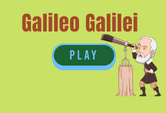Galileo Galilei Facts Game Quiz Online
This page features a Galileo Galilei Facts Game Quiz Online . It is a great exercise for students in 3rd to 9th grades. He was an astromer who by his observations through a telescope led to several interesting discorveries. This fun game is interactive and players will learn some interesting facts about Galileo.

Known as the father of modern physics, Galileo Galilei was an Italian physicist, engineer, and astronomer. Sometimes called a polymath, Galileo was a highly educated man who was blinded by cataracts and interested in a theory of matter. In this article, we will learn about Galileo's life and scientific accomplishments. The most important discoveries he made affected the world today, and his name is synonymous with the search for a unified theory of matter.
Galileo Galilei was a musician
In addition to his scientific work, Galilei was a gifted lute player who attracted the attention of powerful patrons. Galilei began studying music theory in the fifteen seventies. He was a keen follower of ancient Greek drama and music, and became associated with the Camerata in Florence. In 1573, he met Girolamo Mei, the leading scholar of ancient Greek music.
The combination of music and science has a long history, stretching back to the Renaissance conception of the motion of celestial bodies. Galileo's early musical training was likely an influential factor in his scientific accomplishments. In addition to studying music, his father was an accomplished composer, and he had brought a keen experimental sense to his scientific research. Music theory may be the most direct link between Galileo's life and his scientific work.
He was a scholar
Galileo made important discoveries in a variety of fields. Despite his many talents, he is often regarded as a mere 'genius'. Although scholars did not often marry, Galileo had a wife, Marina Gamba, and they raised three children together. One daughter became a nun at the convent in Arcetri, and another, a son, was later a musician. Despite Galileo's aversion to marriage, he was able to secure a lucrative position teaching mathematics in Padua. But the real reason he became a successful scientist is not just because he married the beautiful Marina Gamba. He was very committed to science.
He was blinded by cataracts
Although the cause of Galileo's blindness is unclear, a modern interpretation assumes he was affected by iridocyclitis, an inflammation of the iris, which produced a complicated cataract and synechiae, and occlusion membrane. He was still able to read and write, but the cataracts probably affected his vision.
In addition to cataracts, Galileo was deaf in one ear for a short period of time, which he recovered from. He was also affected by severe joint pain, bloody discharge, and general unhappiness. He was also unable to get out of bed, which hampered his studies of comets. It is unknown whether he also had glaucoma.
He was interested in finding a unified theory of matter
According to the prevailing view at the time, natural science could not explain all phenomena. Qualitative consciousness is separate from natural phenomena, and Galileo wanted to find a theory that would explain all of them. His findings paved the way for modern science, and he is still considered one of the most influential scientists of all time. But not all of his discoveries were revolutionary.
When Galileo was still a young man, he was fascinated by the concept of gravity. He began studying it at age eleven, and later in his early 30s was assigned to a chair in mathematics at the University of Pisa. This job was not a particularly lucrative one, so he lobbied to get a better one. In 1592, he was named Professor of Mathematics at the University of Padua. He taught Euclid's geometry and astronomy until 1610, when was given the responsibility of raising his siblings.
He introduced two new principles
The work of Galileo Galilei is a remarkable example of scientific innovation. This Italian scientist introduced two new principles into the world of science, one on the physical universe and the other on the mental models that underlie those principles. Galileo's major move involved dethroning the Aristotelian physical categories, including the one celestial element and four terrestrial ones, and the differential directional nature of motion.
After analyzing the data from his observations and experiments, Galileo realized that the world of Copernicus and Newton was consistent with a logical argument and observations that he made. Even so, he delayed publishing his most radical experiments for thirty years. This delay in publication was largely due to his opponents' scholastic philosophy, which encouraged scholars to seek knowledge beyond the boundaries of traditional disciplines. The Scholar encouraged new knowledge, but applied ancient philosophical methods to science and philosophy.
